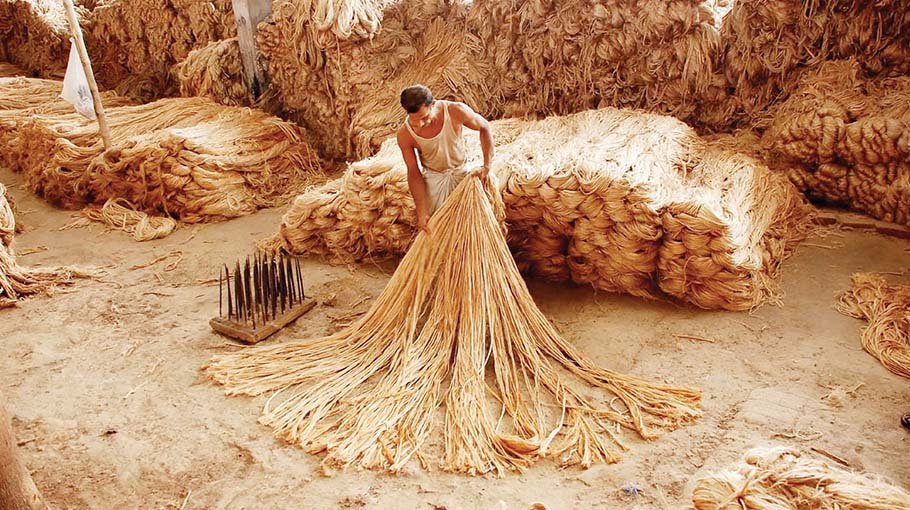Mills in tight spot for jute price hike

An organised syndicate of traders and hoarders is stockpiling raw jute across the country, creating an artificial crisis in the market that has pushed up its prices sharply.
The price of raw jute has jumped from Tk 2,200 to Tk 4,000 per maund in Rajshahi, Chuadanga, Syedpur, Nilphamari, Tangail, Jamalpur and other districts, according to reports from our correspondents.
Many jute mills are now struggling to maintain production levels due to a steep rise in jute prices and a shortage of raw jute.
The rapid spike in raw jute prices has not only affected mill operations but has also led to 25-30 percent increase in the prices of finished jute products, bringing down the demand both locally and internationally.
Our correspondent from Tangail said that local variety, Tosha, Kenaf, Robi-1 and Indian Bongobir varieties are mostly cultivated in this district. Per maund jute was being sold at Tk 3,500 to Tk 4,000.
Shahadat Hossain, a jute farmer of Aag Deuli village under Delduar upazila, said that he sowed jute seed after irrigation as there was a lack of rain at the beginning of jute cultivation. “I sold jute at Tk 4,000 per maund.”
Our correspondents from other districts echoed the same.
According to Chuadanga correspondent, Jibonnagar Upazila Department of Agricultural Extension said that jute has been cultivated on 1,195 hectares of land in one municipality and eight unions of the upazila this season. Farmers have said that they are selling each maund of jute at Tk 2,400 to Tk 2,800.
However, despite a favorable harvest and enthusiastic participation from farmers, many jute mills are facing production halt or reductions, severely impacting the industry.
“Raw jute that we previously purchased at Tk 2,200 per maund is now priced at around Tk 3,600 or more. It has become increasingly difficult to run mills under these conditions,” said Siddikul Alam, Managing Director of Iku Jute Process based in Syedpur.
Rajkumar Poddar Raju, owner of Poddar Agro Industries, said production at his mill dropped from 10 to just 4 tonnes due to the crisis of raw jute.
The recent government initiative to phase out plastic bags and encourage eco-friendly jute products has further fuelled the demand for raw jute.
This policy shift has also incentivised middlemen to stockpile raw jute in anticipation of higher demand, thereby exacerbating the current supply constraints.
Acknowledged the crisis, Mahibur Rahman Lohani, inspector at Syedpur Upazila Jute Extension Department said, “We have received reports on jute hoarding. If we get instructions from high-ups, we will take legal action against those involved.”
In response to the crisis, industry leaders and mills owners are urging the government to take immediate action to break the syndicate behind hoarding, enforce anti-hoarding laws, and monitor unlicensed traders suspected of contributing to price inflation.
Managing Director of Creation Private Limited Md Rashedul Karim Munna told Bangladesh Post, “Global unrest has an impact on our overall production and exports. As the jute sector is likely to see a boom right at time, anyone if found guilty of disrupting the supply chain should be brought under scrutiny.”
According to the Bangladesh Jute Mills Association (BJMA) and the Bangladesh Jute Spinners Association (BJSA), the country produces an average of 7.5 million bales of raw jute annually. However, an estimated of 72.86 lakh bales of raw jute was produced in the country during this season.



